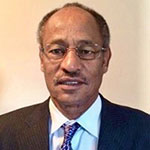In This Story
Originally published on November 23, 2020
The authors are leading a Schar School of Policy and Government new virtual study abroad course in January, Africa Zooms Ahead: African Led Development and African Solutions to African Challenges. Tesfamichael is the former Minister of Finance for Eritrea.
International headlines this week presented a dramatic lesson in the power of African-led initiatives. As the conflict within Ethiopia continues to heat up, the rival faction in northern Ethiopia, the Tigray People’s Liberation Front (TPLF), lobbed rockets at their neighbor to the north, Eritrea. The audacious move was to internationalize the conflict and get the international community to take notice, or even hopefully side with the TPLF, as had been the case when they were the ruling party.
What a difference 20 years makes.
Over the past 60 years, Eritrea has seen only 10 years of peace and the border with Ethiopia’s Tigray region has been particularly contentious. During the worst of the most recent war (1998-2000), hundreds of thousands of soldiers amassed at the border. At that time, it was the world’s biggest conflict. This time, the rockets landed and Eritrea barely shrugged.
When Ethiopia declared war on Eritrea in 1998, they immediately severed all linkages with Eritrea. It became impossible to fly or drive between the countries. Small towns along the border were so intertwined that it’s often said locals raised chickens on one side and sold eggs on the other, but suddenly they were completely cut off from each other, not even able to make a phone call from one country to the other.
In the midst of this communications vacuum, international delegations shuttled between the capitals, desperately trying to broker peace. There was the U.S., the Europeans, the UN, and many more, including a delegation of former Peace Corps volunteers. They all went home frustrated and empty handed.
A very tenuous peace accord was signed in 2000, but Ethiopia’s TPLF-led government refused to implement the final and binding agreement, leading to 18-years of no-peace/no war and a severed border that was like a scar across the Horn of Africa.
Then something miraculous happened. In 2018, a popular uprising led to a new Ethiopian leader, Prime Minister Abiy Ahmed, who vowed to talk to his neighbor and implement a peace agreement. Within just a few weeks there were open borders, flights between capitals, and huge celebrations as the leaders exchanged visits.
Looking at the footage of Abiy’s trip to Asmara and Eritrean President Isaias Afeworki’s to Addis Ababa, one thing was missing—there were no foreigners in the room. When Eritrea and Ethiopia finally brokered peace, they did it themselves.
Unfortunately, the TPLF wasn’t onboard with the new Ethiopian government or peace with Eritrea. Hence, the current situation. But communications and trust between Abiy and Isaias is now so strong that when the TPLF launched its rockets, hoping Isaias would retaliate and internationalize the war, the president instead stood down, giving Abiy the room he needed to deal with his contentious factions. While the international community roundly criticized TPLF leaders for the attack, neither country called for outside help, international observers, or peace negotiators.
What would have previously caused major retaliations and troop deployments, now became no more than a blip. What changed? Africans, working together, finding and implementing their own solutions to their own challenges.
Register for Africa Zooms Ahead and learn more about what Africans are doing to develop their continent. More about study abroad opportunities.


